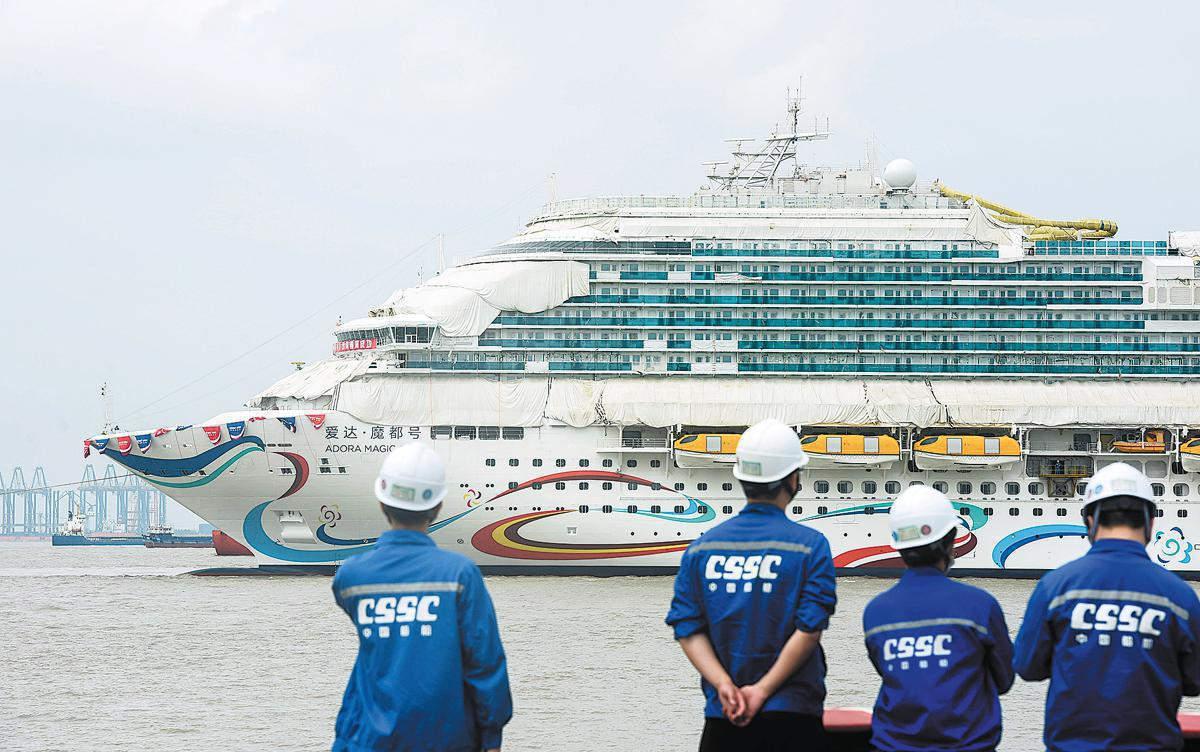Orders for new vessels put China's shipbuilders on robust growth path

China's shipbuilding industry will likely maintain robust growth this year, driven by soaring demand for dual fuel-powered containerships, oil tankers and specialized vessels, market watchers and business executives said on Monday.
In the first five months of this year, orders for new vessels placed with the country's shipyards surged 49.5 percent year-on-year, data from the Beijing-based China Association of the National Shipbuilding Industry showed.
Orders for new vessels, a major indicator of health of the shipbuilding industry, added up to 26.45 million dead-weight tons during the five-month period, with a global market share of more than 67 percent.
In recent months, Chinese shipyards have received new orders for not only containerships and bulk vessels but liquefied natural gas carriers, vehicle carriers and ocean engineering vessels, said Li Yanqing, secretary-general of CANSI.
Two key factors explain the rise in new orders: many countries are implementing the new decarbonization regulations; and existing ships are aging, said Li.
This, Li said, has led carmakers, shipping companies and energy firms to place more orders for the next-generation of environmentally friendly vessels.
China's shipbuilding output grew by more than 15 percent year-on-year to 16.47 million DWT between January and May, accounting for more than 48 percent of the world's total, CANSI data showed.
By the end of May, Chinese shipyards' holding orders totaled 117.99 million DWT, up 15.5 percent year-on-year, claiming nearly 52 percent of the world's market share.
Gao Wenbao, president of Nantong CIMC Sinopacific Offshore and Engineering Co Ltd in Jiangsu province, said the company has already scheduled orders until 2026.
A subsidiary of Shenzhen, Guangdong province-headquartered China International Marine Containers (Group) Co Ltd, CIMC Sinopacific has received orders for eight new ships — two dual-fuel containerships, two medium gas carriers and four dual-fuel bulk carriers, with a total order value exceeding 1.7 billion yuan ($235.21 million) — over the past several weeks.
A medium gas carrier is a type of liquefied petroleum gas tanker which is used for transporting LPG products in large volumes. It has a capacity of 10,000 cubic meters to 30,000 cubic meters and is suitable for both short- and long-range transport, CIMC Sinopacific said.
Gao said the company is currently in discussions with various entities for over 10 dual fuel-powered ships and refueling vessels.
"At present, all major shipyards in China are operating at full capacity, resulting in a significant backlog of orders," he said. "Shipowners may experience delays in securing an early schedule for their orders, if they don't place their orders quickly enough."
Although it is difficult to predict how long the current upcycle would last, the demand for large containerships is expected to stabilize in the future. There will, however, still be some growth in demand for large LNG and LPG carriers in the years to come, said Dong Liwan, a professor of shipbuilding at Shanghai Maritime University.
Dong also said there will be strong demand for large vehicle carriers due to the notable increase in China's exports of new energy vehicles in recent years.
Guangzhou Shipyard International Co Ltd, a subsidiary of China State Shipbuilding Corp, the world's largest shipbuilder by production volume, delivered a luxury Roll On-Roll Off passenger ship to its Italian client Moby Lines in April.
This is currently the largest luxury Ro-Ro passenger ship in the world, according to the State-owned shipbuilder.
Thanks to the shipbuilder's advantages in research and development and the manufacture of marine equipment, the vessel has a large hybrid scrubber system that ensures all emissions meet clean environment targets, the company said.
Driven by such factors, the value of China's ship exports rose by more than 21 percent year-on-year to $8.86 billion in the January-May period, said CANSI.
Invest in China Copyright © 2024 China Daily All rights Reserved
京ICP备13028878号-6
 京公网安备 11010502032503号
京公网安备 11010502032503号





